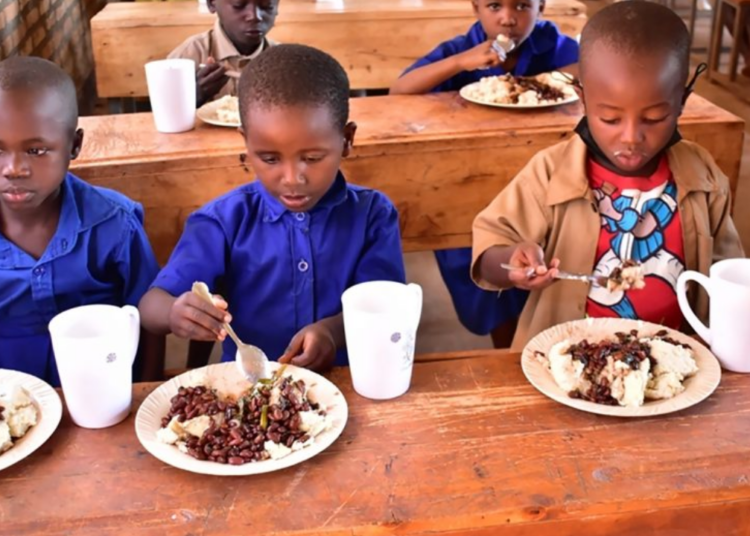The major underlying causes of malnutrition in Nigeria include poor infant and young child feeding practices, poor access to and consumption of safe nutritious diets rich in both macro and micro nutrients, inadequate access to healthcare, water, and sanitation, and a high level of poverty.
The global burden of childhood malnutrition has been a continuing concern for decades, but the progress achieved so far has been far from optimal. Micronutrient deficiencies – especially deficiencies in iron and vitamin A – affect more than two billion people worldwide and increase the risk of stunted growth, cognitive delays, and weakened immunity among young children.
Sadly, infants and young children (IYC) are the most vulnerable population to micronutrient deficiency, given the high vitamin and mineral intake they need to support their rapid growth and adequate development. Promoting appropriate complementary feeding practices is a key intervention in the reduction of micronutrient deficiencies and malnutrition.
A few days ago, the federal government stated that at least 17 million Nigerian children are malnourished, making Nigeria the country with the highest burden of malnutrition in Africa and the second highest in the world.
At a meeting to disseminate the findings of the home fortification implementation research using Small Quantity Lipid-based Nutrient Supplements (SQLNS) and Multiple Micronutrient Powders (MNP) administered to eligible target population in the Federal Capital Territory, Nigeria, the director of Health and Nutrition Ministry of Health, Dr. Binyerem Ukaire, said malnutrition has remained a significant public health problem despite huge investments.
Ukaire said the major underlying causes of malnutrition in Nigeria include poor infant and young child feeding practices, poor access to and consumption of safe nutritious diet rich in both macro and micronutrients, inadequate access to healthcare, water, and sanitation, and a high level of poverty.
To avert the trends, he said the federal government has made concerted efforts in collaboration with development partners to reduce the burden of malnutrition in the country.
According to him, “Malnutrition has remained a significant public health problem despite huge investments. At least 17 million Nigerian children are malnourished, making Nigeria the country with the highest burden of malnutrition in Africa and the second highest in the world.
“The Federal Government of Nigeria has made concerted effort in collaboration with development partners to reduce the burden of malnutrition in the Country. The provision of micronutrients is ranked as one of the most cost-effective interventions for the prevention of malnutrition.”
Specifically, he said home fortification using small quantity lipid-based nutrient supplements (SQ- LNS) and micronutrient powder (MNP) is one of the cost-effective and sustainable strategies being implemented by the government to prevent malnutrition in the country.
“The use of (MNP) for point-of-use fortification of foods has been suggested as an alternative to mitigate or overcome the constraints associated with supplementation and mass fortification. SQ-LNS contains multiple micronutrients embedded in a food base that also provides essential fatty acids and small amounts of energy and protein, targeted toward preventing malnutrition in vulnerable populations.
“The FMOH encourages more research work in the nutrition landscape. However, there is limited published implementation research in-country on home fortification, making this particular research very timely. It is believed that the findings will provide evidence to scale up the best and most effective approaches to intervention programs for the vulnerable groups in the Country.
“The FMOH looks forward to the conclusion of the project and anticipates the receiving of the final research report with actionable recommendations. Findings from such research will provide the baseline for monitoring and evaluating present and future interventions and as well, inform policies and guidance for improving the health and nutrition of the populace,” he stated.
Malnutrition still a chronic problem – NI Nigeria
On his part, Nutrition International Nigeria, country director, Dr. Osita Okonkwo, said malnutrition isn’t just a chronic problem, it’s an urgent problem.
Presenting, the summary of findings, Okonkwo said the implementation fidelity of the project was high with appropriate targeting of poor households with under-five children as beneficiaries and appropriateness of the intervention context.
Okonkwo said caregivers’ perception is improving with increasing duration of the intervention and acceptability of the MNPs by the children and caregivers is generally high.
He said key drivers of adherence include perceived improvements in health, appetite, strength, and physical growth of index children benefits
He recommended that Integrated Community Outreach Clinics have demonstrable potential, capacity, and acceptability to distribute MNP and other nutrition commodities.
He, however, said supervision and logistic supply need to be strengthened to ensure the teams deliver the commodity according to plan.
“Similarly, improved engagement with other stakeholders such as community gatekeepers and household heads can increase acceptability and utilization of MNP in households,” he said.
He recalled that Nutrition International Nigeria received funding from Global Affairs Canada (GAC) to conduct implementation researches in enhancing Home Fortification of Infants and young children (IYC). This funding was part of the Nutrition Emergency response to COVID-19 grant in collaboration with other stakeholders like Health Ministry, FCT Primary Healthcare Board, PLAN International, Oxford Policy Management, National Primary Health Care Development Agency, Global Affairs Canada, Ministry of Finance, Budget and National Planning, United Nations Children’s Fund, World Food Programme and United States Agency for International Development.
He said home fortification of complementary foods with micronutrients, such as micronutrient powders is a proven effective public health intervention, recommended by the World Health Organisation to reduce anaemia and iron deficiency in children 6-23 months of age.
“In accordance to the government regulations around COVID-19 protocols with fewer in-person contacts in delivering health products and services to people. Little is known about how best to implement a home fortification program which limits in-person contact with caregivers of IYC.
“Nutrition International, therefore delivered two home fortification commodities, Micronutrient Powders and Small quantity lipid-based nutrient supplements to the caregivers of children between 6-23 months in this context and conducted two (2) implementation research projects in Urban slums in the FCT, especially in AMAC and Gwagwalada zones, to understand the most appropriate delivery methods. The research project has now been completed with some important findings.
The Canadian High Commissioner to Nigeria, James Christoff, has said Canada has disbursed over CAD 900 million to NI for their global work, making NI Canada’s main global partner in nutrition programming.
Christoff said, “Since 2002, Canada has disbursed over CAD 900 million to NI for their global work, making NI Canada’s main global partner in nutrition programming. Canada’s current six-year funding agreement of CAD 293 million with NI continues to work closely with governments and partners in 60 countries across the world.”
The envoy who was represented by First Secretary, Development, Renata Pistone, High Commission of Canada said Canada’s current six-year funding agreement of CAD 293 million with NI continues to work closely with governments and partners in 60 countries across the world.
Pistone said during the initial years of the COVID-19 pandemic, Canada was also pleased to provide additional funds to Nl to support their much needed vitamin A supplementation efforts, covering Nigeria among other countries.
She reiterated the importance of adopting and maintaining a gender lens for nutrition programming as it is for all other programming.
“Canada’s approach to international assistance remains resolutely feminist, and as such, Canada has prioritised nutrition programming that integrates gender equality considerations to prevent malnutrition in all its forms and has promoted gender equality at all convening opportunities,” she said.
A mother of twins, from Kabusa in FCT Grace Ezra, noted that the micro-nutrient powder has helped to sustain the growth of her children, adding that it has boosted the immune system of her twins.
“At first, one of my twins was not growing well, but after six months of taking the nutrient, he is now very strong.
She added that they are now healthy and can eat well.





